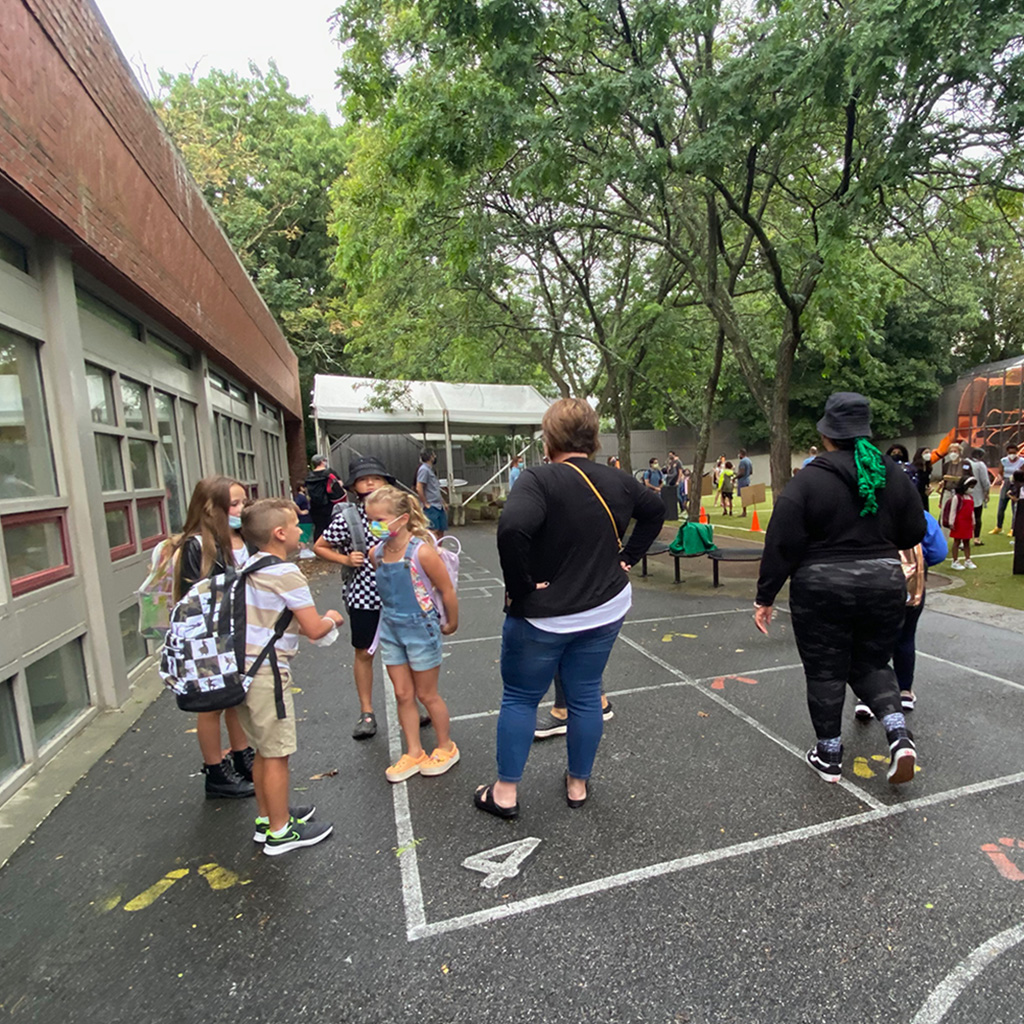New preschool program alters Controlled Choice, the policy that places students in district schools

The first day of classes at The Haggerty School in Cambridge in 2021. (Photo: Marc Levy)
The rollout of free universal prekindergarten next fall may force a full reevaluation of Controlled Choice, the delicate game families play to enroll their children into their preferred Cambridge public elementary school, officials said at Tuesday’s meeting of the School Committee.
Controlled Choice tries to balance classes along socioeconomic and gender lines through a lottery for entry into junior kindergarten and kindergarten held every January for the school year that follows.
The new factor is the Cambridge Preschool Program coming in the fall for all Cambridge 4-year-olds, who will enter as junior kindergartners, and a limited number of 3-year-olds who meet eligibility requirements. Families can apply to the Cambridge Public Schools, which have a limited number of seats; and also to programs run by the City of Cambridge’s Department of Human Service Programs; Head Start; or select community-based preschool providers. Students will be assigned via a single Office of Early Childhood matching lottery held this winter, per a Tuesday policy order. Students with a disability may enroll in a Special Start program exempted from the lottery.
This makes the Cambridge Preschool Program distinct from the school district, meaning the district cannot open registration under the rules of the current Controlled Choice policy, superintendent Victoria Greer said.
The rollout may force a full reevaluation of Controlled Choice, and Greer and staff suggested that the School Committee study the impacts.
“What we call the Controlled Choice policy is more of a collection of School Committee orders over the years,” said David Murphy, the district’s chief operations officer. The committee will need to review several aspect of the proposed policy change in the coming weeks and months, said Murphy, when the district may make additional recommendations.
Responsibility for Controlled Choice falls under the Buildings and Grounds subcommittee, chaired by committee member Jose Luis Rojas.
A second reading of the proposed policy is likely to be on the committee’s Sept. 19 meeting agenda.
The current junior kindergarten and kindergarten lottery for elementary school programs, while adhering to balanced-class requirements, takes some items into consideration when assigning students, including sibling enrollment, language ability and how near a family is to a school.
The scope of the new program – the city plans to increase its preschool programs to approximately 1,000 junior kindergarten students and 300 seats for 3-year-olds in 2025, nearly doubling the 700 students enrolled in 2023, according to WBUR – will change the rules and the calculations that underlie elementary school assignments.
The proposed policy assigns “weighted preferences” to the preschool lottery, which will affect the number of seats available to students who enter the kindergarten lottery: a first preference based on siblings already enrolled in the district; a second preference for 3-year-old entrants; and a third preference for preschoolers assigned to a district junior kindergarten.
In the first preference, preschoolers who have an older sibling in a district elementary school are guaranteed a seat at the same school, and will have until the summer to decide whether to accept that assignment. “The sibling seat is guaranteed to create greater stability,” Murphy said. These sibling seats are reserved until long after families in the kindergarten lottery are required to accept a school assignment and go on a waitlist for a preferred location.
The proposal’s second preference system involves 3-year-old students, who can apply for seats at the Fletcher Maynard Academy, Tobin Montessori Elementary School or a peer seat in the district’s Special Start program classrooms at the Baldwin, Cambridgeport, Graham & Parks, Kennedy-Longfellow, Morse, Peabody and Tobin elementary schools. Students in these schools will get a kindergarten spot automatically.
For the proposed third preference, junior kindergartners who are assigned to a CPP program at a district elementary school will be enrolled automatically in the elementary school for kindergarten. Students who are assigned to a non-district-run program will have to enter the kindergarten school lottery. Preschoolers in the Special Start programs are not automatically assigned to the same place for elementary school, and must also enter the kindergarten lottery, according to the district’s Schools at a Glance publication.
As is the case today, 5-year-olds who are not currently enrolled in a preschool program will enter the January lottery for kindergarten seats in the fall of 2024, according to the city.
The proposed policy could affect the number of seats available for these kindergarten applicants.
“While there will be seats available … those numbers will potentially be different in terms of the seating capacity due to students rolling up – essentially, previous 4-year-olds now being 5,” Murphy said. “That doesn’t mean there won’t be any access, but the numbers potentially will be different on a school-by-school basis.”
While the proposed policy says an enrolled student cannot transfer to a different school, families can apply to switch through a hardship application. Murphy noted that there are “very few denials” under the current hardship process, but that changes to the Controlled Choice policy may make it more difficult for the district to grant transfers.



Yes! Let’s make this more confusing please!
” a first preference based on siblings already enrolled in the district”
I thought legacy admissions were “bad”?
As a parent I’m grateful that things are now MICH MORE CONFUSING. This will be a great cognitive puzzle for my child and family and put us on the path of achievement to solve.
Will the CPS still have close to 50% of third graders unable to read at grade level?
@cportus
I don’t think they can make it more confusing, but in this city, with regard to schools, it is quite possible.
Sam, in what way is sibling preference similar to legacy admissions? The latter refers to parents, not siblings.
Split drop-offs are a major hassle for parents, not to mention completely separate school staff.